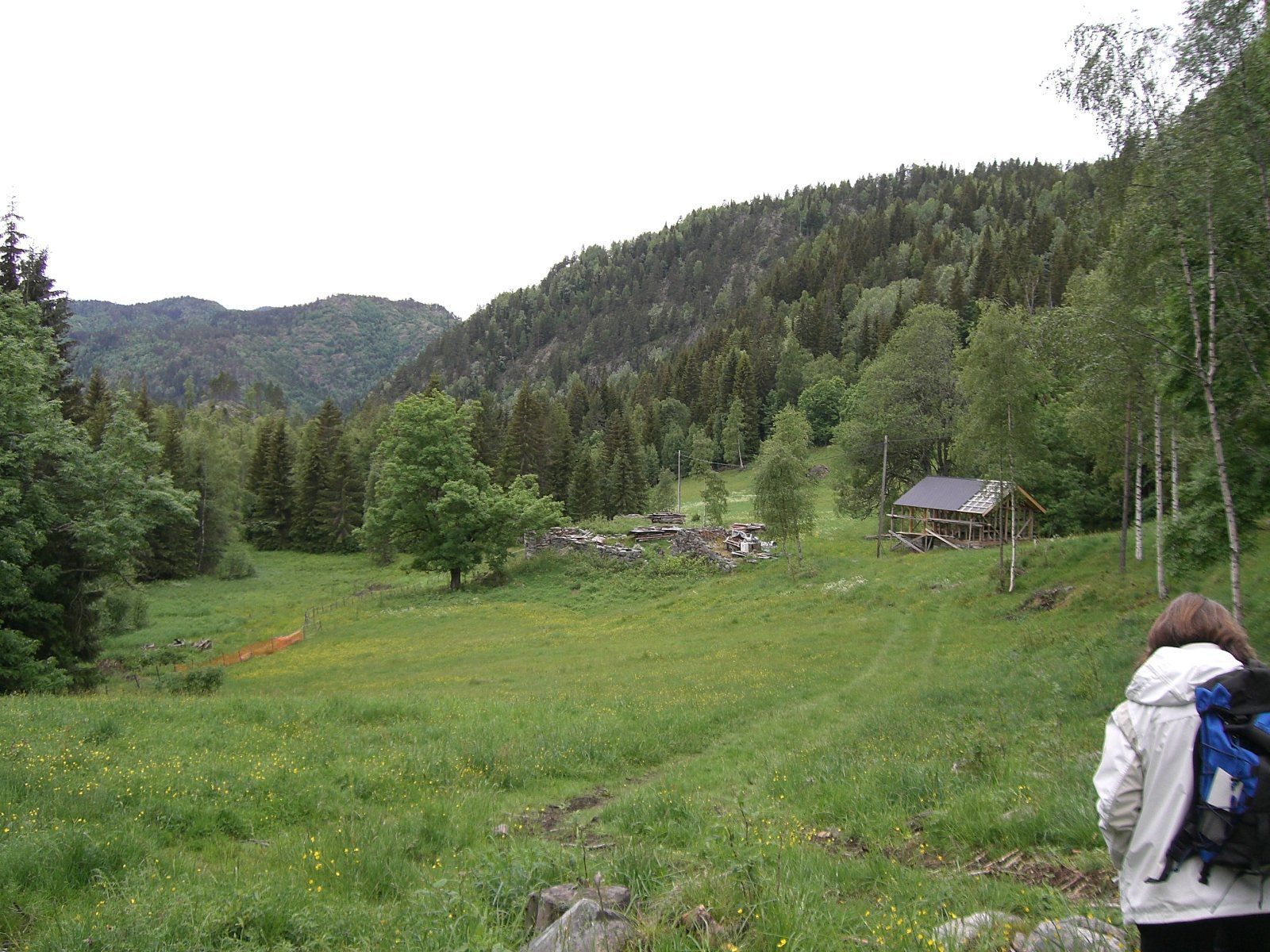1755: leaving... or not
Liv was carrying a basket of yarn out to the sleigh when Halvor of Homme skied up the path to Moen. His breath steamed in the chill air, and his cheeks flushed as red as the clouds overhead. The twenty-three-year-old leaned on his pole as he paused to catch his wind.
"Good day!" Liv said as she settled the basket.
"It's true, then," Halvor panted. "You're leaving."
"I'm part of my father's household. He's leaving, and so must I."
Halvor seemed at a loss for words. "Where?" was all he said.
"He bought the farm at Utbøen, close to Kviteseid. My sister Gunnhild at Haukom sent him word the land was for sale."
"But why would he want to leave?"
Liv shrugged. "Moen properly belongs to my uncle Aslak, and my cousins will inherit. There are too many kin here now. The fields can't support us all."
"Barley fields," Halvor murmured. He looked out across the sloping white landscape, tinted rose with the glow from the early afternoon sky. A red sunset meant Steinar's clan should have fair weather ahead for their journey on the frozen streambed, and plenty of moonlight to see their way once the long hours of night settled in. "Do you want to leave?" he asked, his voice cracking.
"What choice do I have? My three daughters need a home, and there's none here for us, not any longer."
"Oats and rye," Halvor blurted.
"What?"
"I'll plant oats and rye. I know how you hate barley mush. Marry me, and come live at Homme, and I'll plant oats and rye, and whenever we have a good year I'll buy wheat."
Tears sprang to Liv's eyes, and she turned away to wipe at them. The mountain wind scraped like ice at her damp cheeks.
"I know I'm not half the man Torjus was," Halvor said. "I'm not even half his age, that is, if he'd lived." He stammered a moment, stumbling over his poor choice of words. "B-but when Tarald told me what Åmund said, I thought my heart would stop. I can't bear the thought of these dales without you."
Liv caught her breath in a muffled sob.
"I wouldn't blame you if you said no," Halvor stammered. "Perhaps these mountains and dales bring too painful a memory for you. Perhaps you need to go away, to find new surroundings where you can start a new life. Perhaps you need to forget."
"I can never forget," Liv breathed, too low for him to hear.
"But please, just think it over. I'm the heir of Homme. I'll give all my labor and love to you."
Liv turned halfway towards Halvor, her gaze on a star that winked in the north. "I would want to name my first son Torjus," she whispered.
"Done. My word. His memory will always be welcome in my home. In our home."
Sigrid came out of the farmhouse, a large bag in her arms. Her footsteps crunched on the courtyard icepack.
"Siri dear," Liv said, her voice high. "Take that back inside. I don't know when we'll leave, but not today. There's something I must think about."
"Ja, Mor," the girl answered. "Good day, Halvor. Aren't you cold without a cap?"
Liv glanced at him then, and saw his woolen hat wrung tight in his hands. His light brown hair danced in the stiff breeze, flecked with ice crystals. "Come inside for a hot drink, Halvor. Your ears are turning blue."
"I'm afraid what your father will think of my offer. I can afford a good bride-price, but my age—"
Liv put a hand on his arm. "I'm a widow, Halvor, not a young maiden. To remarry is my decision, and mine alone. Come have a seat by the fire, and a drink." Her voice turned wry. "And I'll make you some hearty barley mush to warm you for your trek home."

The sloping fields of Homme farm. (Photo taken in 2006) In "the old days" when the weather was warmer than now, wheat was grown in the lower fields. A new cabin is being built to the right. In the center you can see the crumbling foundation of the old house.
BEHIND THE SCENES
Barley and oats and rye -- Oh my! During the eleventh and twelfth centuries -- the peak of Earth's last global warming period -- the climate in Norway was warm enough to grow wheat as far north as Trondheim.
Then came the Little Ice Age, from 1350 to 1850AD, roughly speaking. We're still in the tail end of that chilly period. Wheat doesn't grow well in the north, but barley, oats, and rye can handle the cooler, shorter summers.
If the current global warming trend continues, mankind will need to adapt to the shifting climate, the way it has through all previous ages.
(There actually is no standard for Earth's climate. It's always changing! Those who now mourn the receding glaciers don't remember the vanished towns those same glaciers swallowed up a few hundred years ago...)
Will wheat grow in Norway again, and grapevines in England?
* * *
Telemark is as far north as Juneau, Alaska – not far from the Arctic Circle. In winter, the long nights leave only a few hours of daylight.
Bạn đang đọc truyện trên: AzTruyen.Top